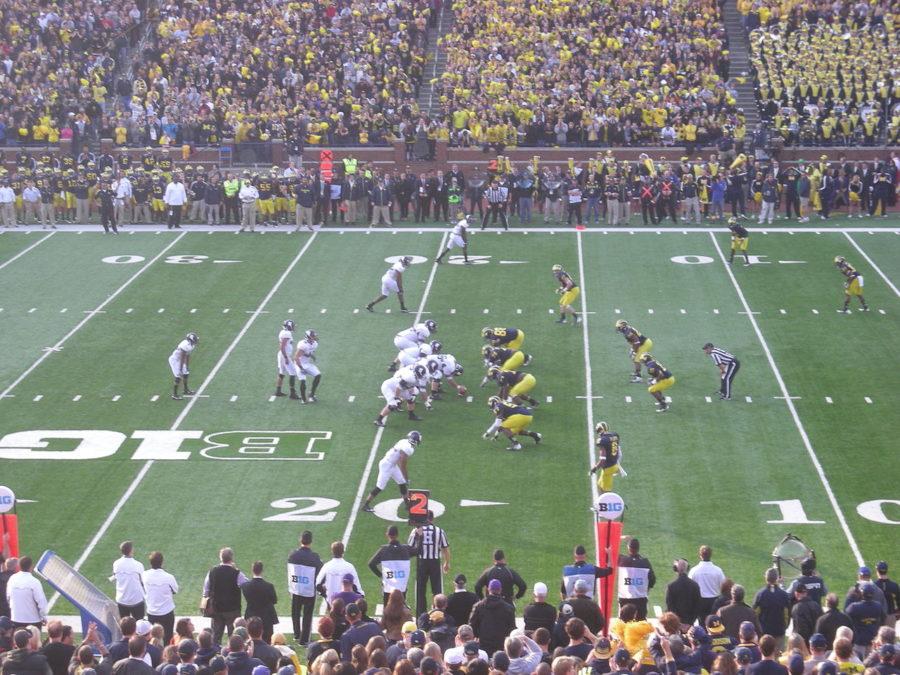Bader: College athletes deserve compensation for full-time work
On Wednesday, the National Labor Relations Board ruled that members of the Northwestern University football team who receive scholarships have the right to unionize.
March 28, 2014
The National Labor Relations Board ruled March 26 that members of the Northwestern University football team who receive scholarships have the right to unionize.
This decision is a win for the football players and for unions in general. Unions allow people with little influence or power to have a say in matters that affect their lives. Student athletes will hopefully be able to improve their college experience through deals made via collective bargaining.
According to a recent CNN article, football players at Northwestern are seeking better medical care, concussion testing and even the possibility of getting paid. So far it appears that unionization is the only way to make their voices heard on the major issues that players face.
One might think that football players in college are first and foremost students and therefore should not be paid. However, given how much time per week that the athletes put into their sport, participating in college athletics is essentially a full-time job. Many of the players on the Northwestern team claim that they felt they needed to prioritize football above school.
If a player is attending college on a sports scholarship, why wouldn’t he or she prioritize sports over school? The student must keep up their performance on the court or field in order to maintain his or her scholarship. Good grades are simply not what pay the bills in that situation.
Personally, I only work a part-time job where I stand around for six hours at a time, and I still find it hard to manage school, social life and extra-curricular activities. I cannot imagine spending 40-plus hours every week dedicated to a sport while maintaining a social life and still achieving spectacular grades. It’s not impossible, but it is much more difficult.
Given their time commitment, professional and collegiate football players are not too dissimilar. Both put in many hours a week practicing the sport and both generate millions of dollars in revenue as a result of the games they play.
The main difference is that professional football players make a profit from their time on the field. The minimum yearly salary for a first year professional football player is $375,000. The most any college football player can hope for is to break even after four years with a full ride scholarship.
The reason that universities give out scholarships to football players is that by giving a more highly valued scholarship, they will be getting better players. By getting better players, a school will make its team more successful. If the team is successful, the university will make more money from ticket sales and through other forms of revenue.
Since universities give out scholarships with the intention to make money from having successful teams, it is only fair that the players receive some of this money. As the system is currently set up, they are being exploited.
Professional football players, like other athletes, are paid because they provide a service. They play football once a week and are paid for doing so because others enjoy watching them play. This is not a difficult concept — the players provide a service for which they are compensated.
College football players do not necessarily need to be making hundreds of thousands of dollars the way professional athletes do, but they should be compensated much more than they currently are. Universities benefit directly from the players’ presence on their teams, and the players’ compensation should be proportional.
Another way to look at this issue is that top NCAA coaches earn salaries similar to that of professional coaches, yet college players only break even with their scholarships. If NCAA coaches are receiving compensation similar to a professional level, it does not seem too far-fetched that NCAA players should receive more reasonable compensation.
One argument for the lack of payment to players is that the profits from football and basketball are needed to support other less popular sports at universities. However, some sports economists, such as Leo Kahane, have recently challenged this line of thought showing that revenue generated from sports like hockey are able to easily cover the scholarships for top players in the sport.
Even if the more popular sports supported all other athletics at a university, players would still deserve some compensation. The bottom line is that universities make more money off of having sports teams than they would if they had no athletics. To not compensate players for this gained value is, quite simply, exploitation.

















